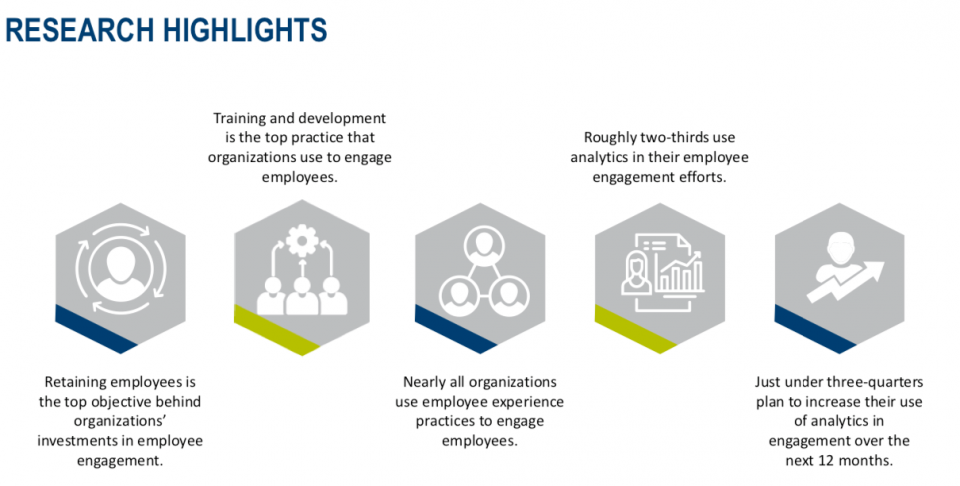73% of organizations plan to increase use of analytics over the next 12 months to promote employee engagement
(HOUSTON, TEXAS – November 11, 2019) In a global survey of 231 cross-industry organizations, APQC found that a majority of organizations increased engagement spending last year and 60% plan to increase employee engagement spending over the next 12 months, with talent retention the number one factor driving the increased investment. Despite higher spending, a majority of survey respondents said that their organization’s engagement program currently falls short of meeting its objectives.
“While 74% of respondents said that retention is one of their top three engagement program objectives, only 24% report that their organization’s engagement practices have proven highly effective at reducing voluntary turnover,” said Elissa Tucker, principal research lead for APQC’s Human Capital Management practice. “So, it is clear that organizations recognize the need for better employee engagement, but our research shows they still have room for improvement in accomplishing that objective.”
APQC’s research also found that traditional engagement approaches, such as the annual employee survey, still dominate, but more innovative approaches, including designing improved employee experiences, are being tested. In line with this shift, 64% of organizations now use analytics to support their employee engagement strategy and 73% plan to increase the use of analytics over the next 12 months. In addition, organizations with the best engagement outcomes are further along in their use of innovative and analytical approaches, such as evaluating social chatter, tracking employee mood, conducting employee sentiment analysis, and identifying touchpoints that matter in the employee experience.
Further, APQC’s survey underscored the critical role that leaders play in the success of engagement efforts, as those that reported the best engagement outcomes were significantly more likely to train leaders on engagement principles and practices (80% versus 59%) and to have leaders who understand and do their part to support employee engagement (82% versus 62%).
Given the lack of success to date for employee engagement practices, Tucker shared four specific steps employers can take to effectively engage, and ultimately retain, talent in today’s competitive labor market.
- Review current employee listening approaches. If traditional approaches are working, keep them going, but also consider whether there would be value in adopting newer methods such as sending frequent, short pulse surveys to a sample of employees or conducting sentiment analysis.
- Block time for HR to learn, pilot, and perfect new engagement practices. For example, provide HR with in depth training on employee experience design methods.
- Address barriers to conducting engagement analytics, including those related to HR technology as well as HR’s analytics capabilities.
- Allot time for leaders and managers to support engagement and consider tying leader and manager compensation to engaging employees.
Additional data and details from the survey can be found in APQC’s newly released report, Engagement and the Employee Experience.
About APQC
APQC helps organizations work smarter, faster, and with greater confidence. It is the world’s foremost authority in benchmarking, best practices, process and performance improvement, and knowledge management. APQC’s unique structure as a member-based nonprofit makes it a differentiator in the marketplace. APQC partners with more than 500 organizations worldwide in all industries. With 40 years of experience, APQC remains the world’s leader in transforming organizations. Visit www.apqc.org, call +1.713.681.4020, or follow @APQC and learn how to Make Best Practices Your Practices®.
# # #
